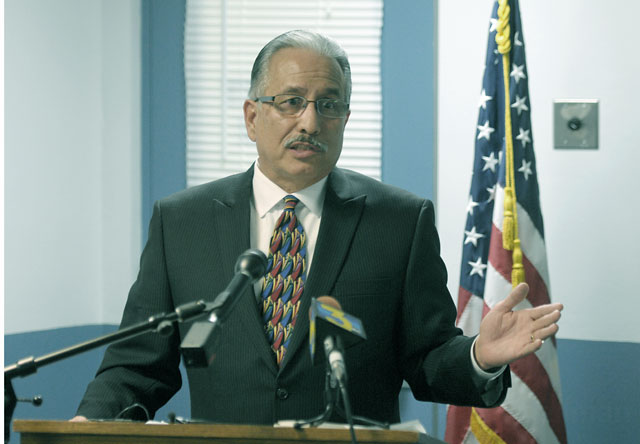Cam Show Gets Frisky
Police Chief Talks Corn Vendors, 'Motherships,' Jail Conditions, and TRUST Act

In what was by the far the liveliest exchange between Santa Barbara Police Chief Cam Sanchez, the City Council, and members of the public since the council first asked the chief to start showing up to give regular presentations, Sanchez was called to weigh in on the allegedly sub-par culinary and sanitary conditions offered at the County Jail. “That’s the Sheriff’s bailiwick,” declared Sanchez, “and I choose to stay out of his bailiwick.” Earlier in the meeting, the council had heard from Steve Price, a homeless man, who charged, “If that jail was a dog shelter, it would be shut down.”
Price, who contends he was arrested for picking birds of paradise from the front of Councilmember Randy Rowse’s Paradise Cafe, offered his remarks after the chief provided the council vivid accounts of cockroach-infested corn vending carts. While such vending carts don’t constitute “the crime of the century,” Sanchez said, they do pose a health hazard and are the subject of frequent complaints.
Sanchez noted that most of the roving vendors aren’t from Santa Barbara but are driven up from Los Angeles in large vans, which Sanchez frequently referred to as “the mothership.” Such carts, he said, are confiscated by city police and held as potential evidence for a year and then ultimately destroyed. Under questioning from Councilmember Grant House — who suggested such vendors might offer a community convenience in some neighborhoods — City Attorney Steve Wiley opined that city law outlawed roving vendors outright and that the law offered them no way to ply their trade legally.
Councilmembers House and Cathy Murillo pressed Sanchez on his thoughts about the TRUST Act, which would have prevented county jails throughout California from turning over undocumented individuals charged with minor offenses to the Department of Homeland Security for deportation under a program dubbed Secure Communities. Although Governor Jerry Brown just vetoed the TRUST (Transparency and Responsibility Using State Tools) Act, Los Angeles Police Chief Charlie Beck announced that he would no longer turn over people charged with minor offenses for deportation. Murillo wanted to know what Sanchez thought about this; House suggested the Secure Communities program exacerbated distrust for law enforcement in immigrant communities.
“It’s not a Latino thing,” Sanchez declared several times, insisting his priority was protecting all people from criminal predators regardless of ethnicity. As for Beck, Sanchez said the L.A. chief operated a sizable jail with serious crowding issues. By refusing to process minor offenders, Beck would ease his space crunch. Unlike Beck, Sanchez said, his department doesn’t operate its own jails, so it wasn’t an issue.
Violent crime dropped substantially from the month of August to September, Sanchez said, from 52 incidents to 30. And gang-related incidents dropped 44 percent in the same period. Despite that sharp drop, he cautioned, in one incident, three Westside gang members were stabbed while walking on the Eastside. Sanchez announced he’d appointed Officer Christina Marshall as the new school resource officer — a position left unfilled for three years. Marshall, he said, busted a gun-toting dope dealer at Santa Barbara High School the first day of class, made three felony arrests, and visited 15 families who had a student truant.
He recounted that the department’s restorative patrol team got 34 street people in recovery in recent months and reunited 16 with their families. And he announced the department would soon purchase video cameras for its patrol cars at a cost of $250,000. That money, Sanchez said, would come from asset forfeiture revenues, not the general fund. The Grand Jury had faulted the department for its lack of such cameras, noting that Santa Barbara and Guadalupe were the only departments in the county not to provide such equipment.
Prior to Sanchez’s remarks, Karl Wagner, a citizen activist, took exception with the erection of street signs banning RV parking along Cabrillo Boulevard at the department’s instigation. Wagner suggested that homeless people bring $5.7 million a year into the city by way of their various benefits. Now that RVs have been forced to vacate, Wagner suggested that beachfront hotels are using public street space to provide valet parking. And Wayne Scoles, the chief’s former nemesis, announced he was so disgusted by the Police Department’s abuse of power — and the alleged cover-ups by the city attorney, the district attorney, and the City Council — that he would be running for mayor next year.
Scoles had been arrested three years ago for threatening Sanchez when the chief was returning from a wedding, but when the case went to trial, the jury rejected the charges, finding the chief’s testimony insufficiently persuasive. Scoles then charged Sanchez with violating his civil rights, but that claim was rejected by a federal judge. When people file complaints against the department, Scoles objected, they are not allowed to see the results of any subsequent investigation, only whether the complaint had been substantiated or not. City administrators noted that the release of any more information would violate the Police Officers Bill of Rights and would subject City Hall to litigation



